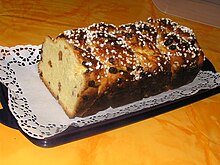Cozonac

Bulgarian Kozunak with raisins, braided and sprinkled with sugar.
|
|
| Alternative names | Bulgarian: козунак |
|---|---|
| Course | Dessert |
| Place of origin |
|
| Region or state |
Romania Moldova Bulgaria |
| Main ingredients |
Wheat flour Butter Milk Eggs Sugar Yeast Raisins Rahat Lemon zest Orange zest Walnuts Hazelnuts Vanilla Rum |
| |
|
Cozonac (Romanian pronunciation: [kozoˈnak]) or Kozunak (Bulgarian: козунак, Bulgarian pronunciation: [kozuˈnak]), from Greek: ϰοσώνα ('doll', i.e. "doll-shaped sweet bread"), is a traditional Romanian and Bulgarian sweet leavened bread, which is a type of Stollen. It is usually prepared for Easter in Bulgaria, and mostly for every major holiday (Christmas, Easter, New Year's Day, Pentecost) in Romania and Moldova.
The dessert is also known as tsoureki (Greek: τσουρέκι), شوريك (Arabic), panarët (Arbërisht), choreg or chorek (Armenian: չորեկ), çörək (Azerbaijani), or çörek (Turkish). It is a sweet, egg-enriched bread, which is rooted in the cuisines of Western and Central Asia. Such rich brioche-like breads are also traditional in many other countries, such as Hungary and the Czech Republic. Examples of similar breads from other cultures include badnji kruh in Croatian cuisine, folar de páscoa in Portuguese cuisine, brioche in French cuisine, kulich in Russian cuisine, panettone in Italian cuisine, and challah in Jewish cuisine.
...
Wikipedia
